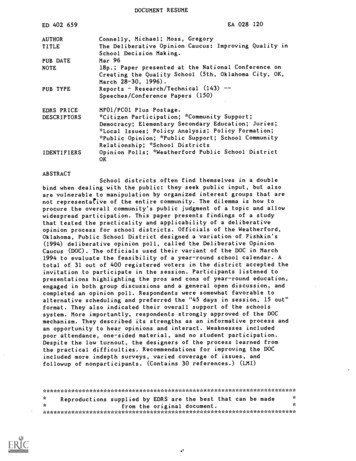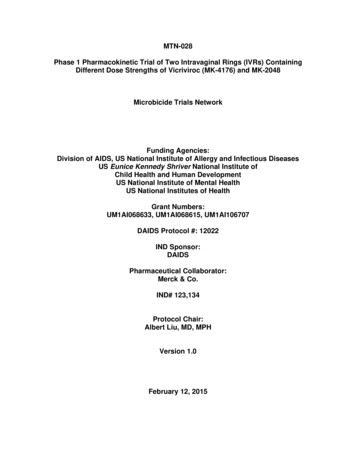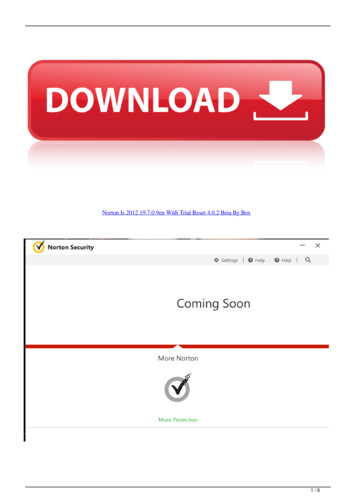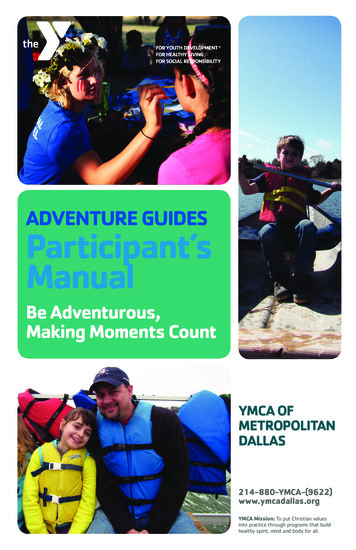
Transcription
DOCUMENT RESUMEEA 028 120ED 402 659AUTHORTITLEPUB DATENOTEPUB TYPEEDRS PRICEDESCRIPTORSIDENTIFIERSConnelly, Michael; Moss, GregoryThe Deliberative Opinion Caucus: Improving Quality inSchool Decision Making.Mar 9618p.; Paper presented at the National Conference onCreating the Quality School (5th, Oklahoma City, OK,March 28-30, 1996).Research/Technical (143)ReportsSpeeches /Conference Papers (150)MFO1 /PCO1 Plus Postage.*Citizen Participation; *Community Support;Democracy; Elementary Secondary Education; Juries;.*Local Issues; Policy Analysis; Policy Formation;*Public Opinion; *Public Support; School CommunityRelationship; *School DistrictsOpinion Polls; *Weatherford Public School DistrictOKABSTRACTSchool districts often find themselves in a doublebind when dealing with the public: they seek public input, but alsoare vulnerable to manipulation by organized interest groups that arenot representative of the entire community. The dilemma is how toprocure the overall community's public judgment of a topic and allowwidespread participation. This paper presents findings of a studythat tested the practicality and applicability of a deliberativeopinion process for school districts. Officials of the Weatherford,Oklahoma, Public School District designed a variation of Fishkin's(1994) deliberative opinion poll, called the Deliberative OpinionCaucus (DOC). The officials used their variant of the DOC in March1994 to evaluate the feasibility of a year-round school calendar. Atotal of 31 out of 400 registered voters in the district accepted theinvitation to participate in the session. Participants listened topresentations highlighting the pros and cons of year-round education,engaged in both group discussions and a general open discussion, andcompleted an opinion poll. Respondents were somewhat favorable toalternative scheduling and preferred the "45 days in session, 15 out"format. They also indicated their overall support of the schoolssystem. More importantly, respondents strongly approved of the DOCmechanism. They described its strengths as an informative process andan opportunity to hear opinions and interact. Weaknesses includedpoor attendance, one-sided material, and no student participation.Despite the low turnout, the designers of the process learned fromthe practical difficulties. Recommendations for improving the DOCincluded more indepth surveys, varied coverage of issues, andfollowup of nonparticipants. (Contains 30 references.) **************************Reproductions supplied by EDRS are the best that can be madefrom the original *******************************
THE DELIBERATIVE OPINION CAUCUS:IMPROVING QUALITY IN SCHOOL DECISION MAKINGbyMichael ConnellyAssociate Professor of Political ScienceandGregory MossAssistant Professor of EducationSouthwestern Oklahoma State UniversityWeatherford, OklahomaU.S. DEPARTMENT OF EDUCATIONOffice of Educational Research and ImprovementEDATIONAL RESOURCES INFORMATIONCENTER (ERIC)This document has been reproduced asreceived from the person or organizationoriginating it."PERMISSION TO REPRODUCE THISMATERIAL HAS BEEN GRANTED BYMinor changes have been made toimprove reproduction quality.Points of view or opinions stated in thisdocument do not necessarily representofficial OERI position or policy.TO THE EDUCATIONAL RESOURCESINFORMATION CENTER (ERIC)."A Paper Presented to the Fifth AnnualNational Conference on Creating the Quality SchoolMarch 28-30, 1996Oklahoma City, Oklahoma2BEST COPY AVAILABLE
THE DELIBERATIVE OPINION CAUCUS:IMPROVING QUALITY IN SCHOOL DECISION MAKINGbyMichael ConnellyAssociate Professor of Political ScienceandGregory MossAssistant Professor of EducationSouthwestern Oklahoma State UniversityWeatherford, Oklahoma"We can no longer afford to overlook the power ofcollective intelligence and cooperative effort. Thereis too much evidence . . that has major implicationsfor the way we do things in school and the workplace."Michael J. Schmoker and Richard B. WilsonTotal Quality Education (1993)In recent years, as educators have looked to the managementprinciples of W. Edwards Deming in their quest for quality education, manyof them have focused on the need for enhancing the role of patrons inschool governance and decision making. Their rationale for this effortincludes the belief that collective processes improve the quality ofdecisions (Schmoker and Wilson, 1993), that relationships with thecommunity are enhanced through such processes (Furman, 1994; Etzioni,1993), and that the organization may be able to create a shared visionamong its stakeholders (Kowalski, 1996).After conducting three different studies of school boards over aperiod of eight years, the Institute for Educational Leadership (IEL)developed a number of "must" recommendations for public schoolboards. Among these, IEL proposed that boards should "convenecommunity forums to discuss major education policy issues and to provideleadership for public education" (Danzberger, 1994, p. 372). Similarly, inThe Spirit of Community, Amitai Etzioni has suggested that "numerousoccasions for active participation" in local governance on the part ofmembers of a community should take place as a means to "buildcommunity" (1993, p. 141).3
MODELS FOR NEW MECHANISMSThis interest on the part of educators parallels current debatesamong many political scientists. Recently, their attention has increasinglyfocused on the needs for and problems of strengthening democraticparticipation and governance and of reducing excessivebureaucratization and self-interest in political decision-making (Rauch,1994; Elshtain, 1995; Lasch, 1995; March and Olsen, 1995). Related ly,academic interest in "social capital" and its role in fostering andmaintaining successful citizenries and economies, its role as "the key tomaking democracy work" (Putnam, 1993, p. 185, 1996; see also Fishkin,1995; Fukayama, 1995) has paralleled the critiques.In these works are strong echoes of earlier analyses of Robert Dahland his frequent, imaginative calls for new mechanisms of publicrepresentation and participation. In After the Revolution?, Dahl suggesteduse of advisory councils of citizens randomly chosen by lot periodically toquestion and advise selected officials (1970; 1990, p. 123). Later, inDemocracy and Its Critics, he proposed creation of a "minipopulus" ofrandomly selected citizens to deliberate and reach "informed judgment"about specific issues for a given period and then to makerecommendations regarding them (1989, p. 340). Similarly, the socialanalyst and pollster Daniel Yankelovich has called for rejection ofsimplistic "public opinion" in favor of informed and deliberated "publicjudgment" and, with the Public Agenda Foundation, has since 1982organized "public choice campaigns" and National Issues Forums todevelop that special judgment (see Yankelovich, 1991).A more ambitious effort to get beyond the superficiality of usualopinion polling to a better conception of what an informed public woulddecide is the "deliberative opinion poll" devised by James Fishkin.Proposed in Democracy and Deliberation (1991) and elaborated in TheVoice of the People (1995), the deliberative opinion poll brings togetherrandomly selected citizens prior to a Presidential election to listen to andquestion candidates directly and to deliberate among themselves to heardifferent viewpoints before definitively selecting their choices for anopinion poll.A planned 1992 poll failed due primarily to resource constraints. In1994, however, a successful poll was held in Manchester, Great Britain,regarding not Presidential choices but options for dealing with crime(Fishkin, 1995, pp. 177-181). Fishkin reports that the British Channel 4 willhold a deliberative opinion poll for the next British general election (1995,p. 170). Most recently, the first National Issues Convention was held in4
January, 1996, to identify key election year issues and to hear fromPresidential candidates (for a description, see Fishkin, 1995, p. 172).Although several major candidates chose not to appear (Kay, 1995), thepoll was covered by major news media and televised nationally by thePublic Broadcasting System.Besides the failure of key officials to participate, the exercise drewother criticisms. Richard Berke, in his New York Times Book Review critiqueof The Voice of the People, questioned how representative a group ableand willing to pick up and leave family and job for the meeting truly was.He also doubted whether the more serene and deliberative environmentof the poll did not unduly eliminate the vitality and emotion necessary tocommitted political deliberation (1996, p. 20). We wait for Fishkin'ssummary and analysis of the Convention to answer these critiques. Suchcriticisms aside, it seems reasonable to ask of the practicality and utility ofthis polling mechanism beyond the special situations designed byProfessor Fishkin. In other words, despite its sound and certainly wellintended purpose, what good is the deliberative opinion poll or similarmechanisms such as Dahl's if they are not, or cannot be, put to widerpractical use? How can or will these tools be used on local levels where"social capital" is most effectively constructed and mobilized?These are not inconsequential concerns. Putnam himself, whomFishkin cites for "social capital" as a justification for his mechanism (1995,pp. 148-149), ends his Making Democracy Work with an appeal toattention to local formation of the valuable resource. Says Putnam, 'Thoseconcerned with democracy and development . should be building amore civic community, but they should lift their sights beyond instantresults. We agree with the prescription of . . local structures rather thanreliance upon national initiatives ." (1993, p. 185).Greater attention to broader, more practical use of Dahl/Fishkintype public participation and judgment in policy development andimplementation comes from the consistent work of Peter deLeon, who hasfrequently called for implementing "critical policy analysis" throughimplementation of "participatory policy analysis" (1994). According todeLeon, such a procedure would require that "public opinion be soughtout conscientiously by the policy analyst, who randomly selects,educates, and then listens to a number of citizens," preferably based onrandom selection, whose views are recorded through "policy polling"(1994, p. 205). This procedure would avoid incorporating self-interestedviews of elites or interest groups and relying on uninformed opinion foundin common polling. Similar to Fishkin's work in Manchester, it could,however, be initiated on any level by any willing official. Moreover, all5
phases of the policy process, from formulation through evaluation, wouldbe amenable to the proposed procedure (1994, p. 205). It is thus muchbroader in applicability and more flexible in use than Fishkin's experimentsto date.DeLeon does not ignore the real, practical difficulties of such aprocess, some of which were discovered by Fishkin, as mentioned.Among predictable problems are: (1) recruitment of representativeparticipants, (2) time and dollar costs, and (3) lack of experience orexperimentation to identify the realities of implementation (1994, p. 205).In addition, one can expect obstacles arising from policymaker inertiaand intransigence (1994, p. 208), timing of issues for their salience andrelevancy, coordination of participants' schedules, or incentives(monetary to civic) for participation from the beginning (1994, 206-207).According to deLeon, it would be necessary to recognize that "citizensgenerally are willing to engage in activities that approach theseconditions in a spirit of personal morality and civic responsibility thattranscends strict economic self-interest and remuneration" (1994, p. 207).Specifically, then, deLeon proposes "to develop a much moreproactive forum procedure in which participants are chosen on arepresentative basis . . and then educated to the intricacies of theargument" (1994, p. 207). The effect will be to allow participants to "sharea certain body of information and procedures . while being receptiveto a wider degree of representation" (1994, p. 207). This process would notbe designed for constant use but for "judiciously" selected opportunities"when feasible" (1994, p. 208). Thus, "[w]ith limited success in carefullychosen situations, critical policy analysis might achieve sufficient currencyto be adapted elsewhere" (1994, p. 208). This may "serve as a basis fordiscussion towards opening and mining a promising research vein" and "iftaken seriously by citizens, analysts, and policymakers, it might very wellrenew what many observers have called a flagging faith in government".(1994, p. 209).The promise, then, of deliberative polling mechanisms proposed byDahl, Fishkin, deLeon, and others is two-fold: (1) to provide better citizeninput to their officials through informed judgments and (2) to foster greater"faith in government" through opportunities for creation and promotion ofmore "social capital." While all levels of contemporary government canclearly benefit today from greater success at both goals, public schoolsmay be in greatest need of success. As officials of an Oklahoma schooldistrict in 1994, the authors decided to test the practicality andapplicability of the deliberative opinion process to local school districts.6
THE "DOUBLE BIND" OF PUBLIC SCHOOLS IN A DEMOCRACYDissatisfaction with and criticism of public schools and their actionshave grown with the general wail against government, discussed above.Traditionally "expert" and "in control," public schools have increasinglydiscovered a public wanting a greater role in school decision-making andquestioning any isolated, unresponsive school bureaucracy (Finn, 1991;Toch, 1991; Bloom, 1992; Marshall & Tucker, 1992; Martz, 1992; Perelman,1992; Lieberman, 1993; Hanushek
AUTHOR Connelly, Michael; Moss, Gregory TITLE The Deliberative Opinion Caucus: Improving Quality in. School Decision Making. PUB DATE Mar 96 NOTE 18p.; Paper presented at the National Conference on. Creating the Quality School (5th, Oklahoma City, OK, March 28-30, 1996). PUB TYPE Reports Research/Technical (143) Speeches /Conference Papers (150) EDRS PRICE MFO1 /PCO1











